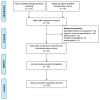Vitamin C and Neutrophil Function: Findings from Randomized Controlled Trials
- PMID: 31487891
- PMCID: PMC6770220
- DOI: 10.3390/nu11092102
Vitamin C and Neutrophil Function: Findings from Randomized Controlled Trials
Abstract
Vitamin C is known to support immune function and is accumulated by neutrophils to millimolar intracellular concentrations suggesting an important role for the vitamin in these cells. In this review, the effects of vitamin C, as a mono- or multi-supplement therapy, on neutrophil function were assessed by conducting a systematic review of randomized controlled trials (RCTs). Specifically, trials which assessed neutrophil migration (chemotaxis), phagocytosis, oxidative burst, enzyme activity, or cell death (apoptosis) as primary or secondary outcomes were assessed. A systematic literature search was conducted using the Cochrane Central Register of Controlled Trials, EMBASE, Embase Classic, Joanna Briggs Institute EBP, Ovid MEDLINE®, Ovid MEDLINE® In-Process & Other Non-Indexed Citations, Ovid Nursing Database, CINAHL and PubMed database, which identified 16 eligible RCTs. Quality appraisal of the included studies was carried out using the Cochrane Risk of Bias tool. Three of the studies assessed neutrophil chemotaxis in hospitalised patients or outpatients, two of which showed improved neutrophil function following intravenous vitamin C administration. Ten RCTs assessed neutrophil phagocytosis and/or oxidative burst activity; five were exercise studies, one in smokers, one in myocardial infarction patients and three in healthy volunteers. Two of the multi-supplement studies showed a difference between the intervention and control groups: increased oxidative burst activity in athletes post-exercise and decreased oxidant generation in myocardial infarction patients. Two studies assessed neutrophil enzyme activity; one showed deceased antioxidant enzyme activity in divers and the other showed increased antioxidant enzyme activity in athletes. One final study showed decreased neutrophil apoptosis in septic surgical patients following intravenous vitamin C administration. Overall, 44% of the RCTs assessed in this review showed effects of vitamin C supplementation on neutrophil functions. However, the studies were very heterogeneous, comprising different participant cohorts and different dosing regimens. There were also a number of limitations inherent in the design of many of these RCTs. Future RCTs should incorporate prescreening of potential participants for low vitamin C status or utilize cohorts known to have low vitamin status, such as hospitalized patients, and should also comprise appropriate vitamin C dosing for the cohort under investigation.
Keywords: apoptosis; ascorbic acid; chemotaxis; migration; neutrophils; oxidative burst; phagocytosis; polymorphonuclear leukocytes; systematic review; vitamin C.
Conflict of interest statement
The authors declare no conflict of interest.
Figures
Similar articles
-
Enhanced human neutrophil vitamin C status, chemotaxis and oxidant generation following dietary supplementation with vitamin C-rich SunGold kiwifruit.Nutrients. 2015 Apr 9;7(4):2574-88. doi: 10.3390/nu7042574. Nutrients. 2015. PMID: 25912037 Free PMC article.
-
Nutritional interventions for treating foot ulcers in people with diabetes.Cochrane Database Syst Rev. 2020 Jul 17;7(7):CD011378. doi: 10.1002/14651858.CD011378.pub2. Cochrane Database Syst Rev. 2020. PMID: 32677037 Free PMC article.
-
Antioxidant supplementation enhances neutrophil oxidative burst in trained runners following prolonged exercise.Int J Sport Nutr Exerc Metab. 2003 Sep;13(3):369-81. doi: 10.1123/ijsnem.13.3.369. Int J Sport Nutr Exerc Metab. 2003. PMID: 14669936 Clinical Trial.
-
Oral vitamin C treatment increases polymorphonuclear cell functions in type 2 diabetes mellitus patients with poor glycemic control.Nutr Res. 2020 Jul;79:50-59. doi: 10.1016/j.nutres.2020.05.010. Epub 2020 May 23. Nutr Res. 2020. PMID: 32610257 Clinical Trial.
-
Drugs for preventing lung cancer in healthy people.Cochrane Database Syst Rev. 2020 Mar 4;3(3):CD002141. doi: 10.1002/14651858.CD002141.pub3. Cochrane Database Syst Rev. 2020. PMID: 32130738 Free PMC article.
Cited by
-
Exploring the Impact of COVID-19 on Ulcerative Colitis Patients: A Lifestyle Perspective.Medicina (Kaunas). 2024 Jan 20;60(1):182. doi: 10.3390/medicina60010182. Medicina (Kaunas). 2024. PMID: 38276061 Free PMC article.
-
Vitamin C: From Bench to Bedside.Nutrients. 2021 Mar 27;13(4):1102. doi: 10.3390/nu13041102. Nutrients. 2021. PMID: 33801745 Free PMC article.
-
No Effect of Vitamin C Administration on Neutrophil Recovery in Autologous Stem Cell Transplantation for Myeloma or Lymphoma: A Blinded, Randomized Placebo-Controlled Trial.Nutrients. 2022 Nov 11;14(22):4784. doi: 10.3390/nu14224784. Nutrients. 2022. PMID: 36432471 Free PMC article. Clinical Trial.
-
Intravenous Ascorbic Acid and Lung Function in Severely Ill COVID-19 Patients.Metabolites. 2022 Sep 14;12(9):865. doi: 10.3390/metabo12090865. Metabolites. 2022. PMID: 36144269 Free PMC article. Review.
-
Overview of the possible role of vitamin C in management of COVID-19.Pharmacol Rep. 2020 Dec;72(6):1517-1528. doi: 10.1007/s43440-020-00176-1. Epub 2020 Oct 28. Pharmacol Rep. 2020. PMID: 33113146 Free PMC article. Review.
References
-
- Weiss S.J. Tissue destruction by neutrophils. N. Engl. J. Med. 1989;320:365–376. - PubMed
Publication types
MeSH terms
Substances
LinkOut - more resources
Full Text Sources
Medical



